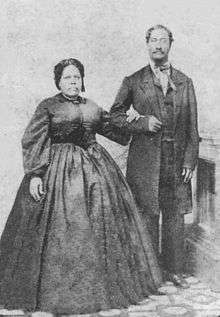Keohokālole
Analea Keohokālole (1816–1869) was a Hawaiian chiefess and matriarch of the House of Kalākaua that ruled the Kingdom of Hawaiʻi from 1874 to 1893. Her Hawaiian name Keohokālole means "the straight hair of her own father's tresses" and was given to her at birth by Queen Kaʻahumanu.[2]
| Analea Keohokālole | |||||
|---|---|---|---|---|---|
 | |||||
| Born | c. 1816 Kailua, Kona, Hawaii Island | ||||
| Died | April 6, 1869 Hilo, Hawaii Island | ||||
| Burial | April 18, 1869[1] Kawaiahaʻo Church Cemetery November 30, 1875 Mauna ʻAla Royal Mausoleum | ||||
| Spouse | Caesar Kapaʻakea | ||||
| Issue | James Kaliokalani King David Kalākaua Queen Lydia Liliʻuokalani Anna Kaʻiulani Kaʻiminaʻauao Miriam Likelike William Pitt Leleiohoku II | ||||
| |||||
| House | Kalākaua | ||||
| Father | High Chief ʻAikanaka | ||||
| Mother | High Chiefess Kamaʻeokalani | ||||
Life
Keohokālole was born at Kailua-Kona, Hawaii in 1816. She was daughter of the High Chiefess Kamaeokalani and the High Chief ʻAikanaka. Through her father she was descended from Kame'eiamoku and Keawe-a-Heulu two of the four Kona chiefs that supported Kamehameha I.
.jpg)
In 1833 she married Caesar Kapaʻakea, a chief of lesser rank and her first cousin. Their union produced more than ten children. They were among the few Hawaiian chiefs to have such a large family. Many nobles of their time died very young and issueless. Their children were: James, David, Lydia, Anna, Kaʻiminaʻauao, Miriam, and Leleiohoku. She inherited vast tracts of land from her paternal grandmother Keohohiwa and great uncle Naihe.[3] Like many of the high chiefs, she quickly found herself land rich but cash poor. The wealthiest chief was the monarch with landholding worth perhaps $1.3 billion in today's dollars. Unlike the monarch, the average high chief got an award, after taxes, of perhaps just a bit over $3.5 million. Keohokālole gained lands worth quite a bit more than the average chief. By the time of her death, only half the land she inherited from her father remained, which had to be divided by her four surviving children: David, William, Miriam and Lydia.[4] When David Kalākaua became king less than twenty years later he had no great personal wealth. His lack of money and his attempts at securing income commensurate with his view of his station caused his reign to be dogged by bribery and corruption scandals.[4]
She served as a member of the House of Nobles from 1841 to 1847, and on the King's Privy Council 1846 to 1847.[5] She died at Hilo, on April 5 or April 6, 1869.[6][7]
Initially buried in the Kawaiahaʻo Cemetery, her son Kalākaua had her remains removed to the Royal Mausoleum of Hawaii on November 30, 1875.[8]:159[9]
There is a road named Ane Keohokālole highway near Kailua-Kona, Hawaii.[10]
Family tree
Kalākaua family tree |
|---|
|
Key- (k)= Kane (male/husband) Notes:
|
References
| Wikimedia Commons has media related to Keohokālole. |
- "Funeral Of The Late Hon. Mrs. A. K. Kapaakea". The Hawaiian Gazette. Honolulu. April 21, 1869. p. 3. Archived from the original on August 26, 2018. Retrieved August 25, 2018.
- All about Hawaii: The Recognized Book of Authentic Information on Hawaii, Combined with Thrum's Hawaiian Annual and Standard Guide. 91. Honolulu: Honolulu Star-Bulletin. 1974. p. 259.
- "Keohokālole, Ane/Analea" (PDF). Mahele Book. p. 364. Archived from the original (PDF) on July 7, 2011. Retrieved November 24, 2009.
- Kahana: How the Land Was Lost By Robert H. Stauffer. Page 70-84
- "Keohokalole, A. (w) office record". state archives digital collections. state of Hawaii. Archived from the original on July 21, 2011. Retrieved November 7, 2009.
- "Death of Hon. Mrs. Keohokalole". The Pacific Commercial Advertiser. Honolulu. April 10, 1869. p. 3. Archived from the original on August 26, 2018. Retrieved August 25, 2018.
- "Obituary". The Hawaiian Gazette. Honolulu. April 14, 1869. p. 4. Archived from the original on August 26, 2018. Retrieved August 25, 2018.
- Judd, Walter F. (1975). Palaces and Forts of the Hawaiian Kingdom: From Thatch to American Florentine. Palo Alto, CA: Pacific Books. ISBN 0-87015-216-5.
- "Removal of Remains". The Pacific Commercial Advertiser. Honolulu. December 4, 1875. p. 3. Archived from the original on August 26, 2018. Retrieved August 25, 2018.; "Notes of the Week". The Hawaiian Gazette. Honolulu. December 1, 1875. p. 3. Archived from the original on August 26, 2018. Retrieved August 25, 2018.
- Plan of Keohokālole highway Archived July 25, 2011, at the Wayback Machine at Hawaii County web site